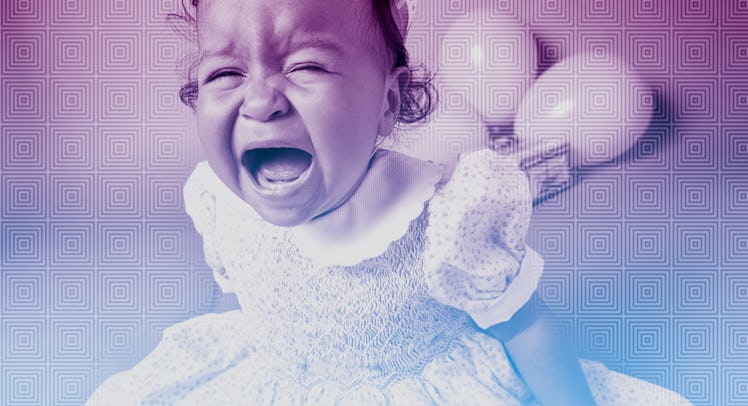Why Do Kids Cry At Their Own Birthday Parties?
Young children meltdown at their birthdays because their parties aren't about them. They're about the parents.

Young children often cry at their birthday parties and not because they’re big Lesley Gore fans. Instead, it’s due to a variety of reasons that depends on their age, personality type, and whether or not they’ve seen a clown before and didn’t freak.
“Kids under the age of four or five typically cry because it’s completely overwhelming,” Kryss Shane, a family therapist specializing in child development told Fatherly. For one, parents are frazzled to get everything right, there’s a crowd of children, and maybe even a pony. Plus, everyone wants a picture with them. “It kind of freaks them out because that’s not an experience most little kids have on a regular basis.”
Children’s reactions to their birthdays, particularly the parties, is a relatively understudied topic. In the past, birthday parties at home have been used to study the symptoms of children with autism diagnoses. They have similarly been used to research commercialism and consumerism in mothers and their kids. However, the only paper to come close to answering the question of why kids cry at their own birthday parties was published in the journal Economic Theory suggests it may simply have something to do with how circular cakes are cut.
To Shane, it’s slightly more complicated than that. Kids cry at their birthdays for the same reason adults feel embarrassed when waiters sing the birthday song at Chili’s. The difference is that young children haven’t developed the same coping skills and they don’t always know that the song will eventually end and all the singing and clapping people will go away. “They don’t always have a way to get those feelings out of their body except through crying,” she says.
Forcing them to take a picture with a pony or clown while they’re crying and expressing that they need to take a break isn’t going to help them build character or learn a lesson. It’s just going to give them another reason to fear wildlife and clowns.
Before the age five, introverted and extroverted children might be prone to crying, but for different reasons. While introverted children may feel overstimulated by noise and attention, extroverted kids may get overwhelmed by the social pressure to interact with everybody. There are specific times when kids may be more likely to cry than others, such as while singing happy birthday or while opening presents, but it can really happen at any time during the event. When it does, it’s important to let children lead and practice setting their own boundaries. Forcing them to take a picture with a pony or clown while they’re crying and expressing that they need to take a break isn’t going to help them build character or learn a lesson. It’s just going to give them another reason to fear wildlife and clowns.
As kids get older, it becomes easier to avoid birthday meltdowns for both developmental and logistical reasons. They develop more coping skills to deal with the overstimulation, stress, and attention, but they’re also able to engage more actively in the planning process and ask for what they need. If a kid prefers smaller groups and is overwhelmed by loud noises and crowds, they’re probably going to respond better to an intimate gathering to a blowout. It is as important for parents to let their kid weigh on the basic logistics of how the party goes as it is for them to decide that it’s Elsa-themed, Shane says.
When kids continue crying at their birthday parties as they get older, it may be, in some instances, a symptom of a sensory processing disorder. If parents are concerned, they may want to consult with their pediatricians. But in these instances, symptoms will often be apparent in everyday contexts, not just birthdays. More frequently, the issue is that parents get caught up in what they want the party to look like without paying attention to what their kids are asking for.
All of this is understandable, Shane says. Having a healthy child is an enormous accomplishment for parents and reaching their first and subsequent birthdays is a milestone worth celebrating. “It’s amazing, but it’s so clearly not about the kid,” Shane says. “Really it’s a celebration that the parents have made it a full year of not sleeping and changing diapers.”
So maybe just have a separate party for that and call it what it is. And like the best parties, this one will really get started when your kid goes down for a nap.
This article was originally published on